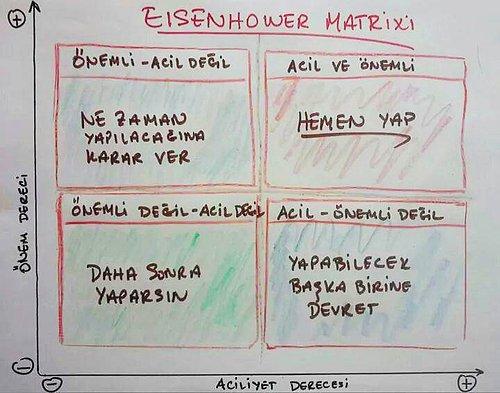
One of our biggest problems is not being able to manage time. You know very well that in the midst of all the work and hustle and bustle, we sometimes waste our time struggling with completely unimportant things. The result is unfinished business, late meetings, canceled friend meetings.
For everyone, one of the most important constraints of life is ‘time’. Or maybe it’s timelessness. We can’t make time for many things, we can’t finish what needs to be done. This is a big problem, especially for those in business. When we race against time on things, we often put the urgent ones first. However, many ‘urgent’ tasks are not really important. The opposite is also true. The important thing is that most of our jobs are actually not that urgent. In any case, we can’t do time management because we can’t make this distinction in general. Many ‘time management’ methods are used to overcome this problem. Almost all of them have a common focus: To be able to order the priorities correctly..
Here, the Eisenhower Matrix is one of the simplest models for how to manage time effectively.

This matrix, developed by former US President Dwight D. Eisenhower, is based on categorizing and prioritizing the work that needs to be done in this way, by dividing a coordinate system into 4 quadrants as “urgent – not urgent” and important – “not important”.
1. Urgent and important (Crises) – Do it now

Unfortunately, it’s the things that need to be resolved right away that you have to quit all your other work and do. If you have a very full, inflexible agenda, they will disrupt all your work.
2. Not urgent and important – Decide when to do it.

A truly self-determined region where you have long-term plans that make a real difference in your future. Like starting a business, writing a book, getting a master’s degree , learning an instrument, starting a family. Try to devote most of your time to this.
3. Urgent but unimportant – If there is someone else who can do it for you, hand it over to him.

Generally, things that someone else asks you to do that you have not determined and that do not serve your long-term plans. Generally, incoming e-mails, ringing phones, what others want from you at work, etc. are included in this.
4. Not urgent and unimportant – You’ll do it later

You’d better do it, but even if you don’t, things that won’t make a big difference in your life. If you want to spare time for more important tasks, you can eliminate such tasks directly.
In short, it can be very useful to remember this matrix when ordering and prioritizing work to be done. If you really think that you do not manage your time well, you have probably tried different methods so far. If you still can’t manage, those methods didn’t work. Also, it’s good to try that.














